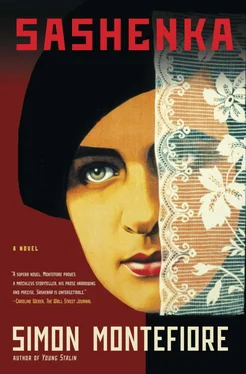“Why not?”
“We hope you’re destroying our enemies, German agents and zhyd nihilists!” The stationmaster rubbed his hands.
“Absolutely! When’s the next train to the Finland Station? I have a report to file.”
“Five minutes, Your Excellency. God Save the Tsar!”
The Grand Duke’s crested Benz was already parked among the carriages outside the Radziwill Palace on Fontanka when Pantameilion’s Delaunay swung into the forecourt, the chains wrapped around the wheels just gripping the ice. Samuil and Ariadna Zeitlin waited their turn while the French Embassy Renault dropped Ambassador Paleologue and his wife.
The Izmailovsky Guards in green tunics, the gendarmes with their sultan-spikes and the Cossacks in leather trousers and high furs, flicking their thick whips, bivouacked around bonfires in the squares and guarded the street corners. The air steamed with horse sweat and manure and sweet woodsmoke; the cobbles clattered with the clipclop of a thousand hooves, the rumble of howitzer carriages, the metallic rattle of rifles, horse tackle and scabbards.
The melody of waltzes and laughter wafted down the marble stairs of the palace. The Zeitlins greeted the French ambassador and his wife at the top of the steps. The foursome were just agreeing how quiet the city was when a gunshot echoed over the rooftops. Dogs howled, sirens wailed and somewhere out toward the Vyborg Side the city herself seemed to growl.
“How are you, dear Baron? Are you better, Baroness?” The French ambassador bowed, speaking fluent Russian.
“Much better, thank you. Did you hear that?” asked Ariadna, her eyes iridescent as whirlpools. “A firework!”
“That was gunfire, Baroness, I fear,” replied the ambassador, immaculate in black coat, top hat and white tie. “There it is again. The metal factory workers are marching in their hundreds of thousands from Petrograd, Vyborg and Narva.”
“I’m freezing,” shivered Ariadna.
“Let’s go in,” said the Frenchwoman, taking her hand.
The ambassador’s wife and Ariadna, both in floor-length furs, one in ermine, the other in seal, walked inside, handing their coats to the staff. Ariadna, like an angel stepping out of a fountain, emerged glistening and pale in a mauve brocade gown embroidered in diamonds with a high bosom and low-cut back. She embraced the richest couple in Lithuanian Poland, Prince and Princess Radziwill.
“You’re so good to come, Ariadna, and you, Madame Paleologue, on such a night. We wondered whether to cancel but dearest Grand Duke Basil absolutely banned it. He said it was our duty, yes, our duty. We’ve spoken to General Kabalov and he’s most reassuring…”
More gunshots. Zeitlin and the ambassador remained outside on the steps, peering into the night. Puttering limousines and whispering sleighs dropped off the guests. Diamonds and emeralds hung like dewdrops on the ears of the women who moved like animals in their sleek furs. Perfume vied with the biting cold for possession of the air. Zeitlin lit a cigar and offered one to the ambassador.
They were both silent. The ambassador, knowing how prices were rocketing and the secret police warning of imminent unrest, was amazed to find ministers and Grand Dukes at play on a night like this.
Zeitlin was lost in his private thoughts. He had lived through riots, demonstrations, pogroms, two wars and the 1905 revolution, emerging richer and stronger each time. Things at home were calm again; his uncharacteristic flash of madness and doubt was over.
Dr. Gemp’s injections of opium had restored Ariadna; the divorce was off; Sashenka was enrolled in Professor Raev’s classes; and Lala seemed calm and acquiescent. The only worry was Gideon. What was that scallywag, that momzer , up to?
Gideon Zeitlin was on his way home, driven by Leonid the butler in the big touring car, the Russo-Balt, with two hundred rubles in his pocket. Cossacks and guardsmen had erected checkpoints around the official Liteiny cordon that guarded the General Staff, War Ministry and Winter Palace. But as Gideon crossed Nevsky, some workers threw stones at the car.
“Filthy speculator!” they shouted. “We’ll teach you to fleece the people.”
The stones drummed on the roof but Gideon, always slightly screwed even when sober, was not scared. “Me? Of all people? It’s my brother you want, you fools!” he muttered, slapping his thigh. “Drive on, Leonid! It’s not our car they’re smashing up! Ha ha!” The butler, a nervous driver at the best of times, was less amused.
They pulled up on Tenth Rozhdestvenskaya, a narrow street of tall new apartment buildings. Gideon leaped out of the car, tugging his coat with its beaver collar around his shoulders.
“I’ll be off then,” said Leonid.
“Hmm,” said Gideon, who had promised his wife, children and brother Samuil to spend some time at home. But he could not quite commit himself. “I’d like you to wait.”
“Sorry, Gospodin Zeitlin, I don’t like to leave the car out for too long,” replied the servant. “The baron said, ‘Drop him off and come home,’ and I work for the baron. Besides, the motorcar could get stoned by the workers and this is a beautiful machine, Gospodin Zeitlin, many times more beautiful than the Delaunay or—”
“Good night, Leonid, godspeed!”
Nodding cheerily at the doorman (while thinking, You informing Okhrana scum!), Gideon strolled through the marble lobby and caught the elevator, an Art Nouveau beauty of polished amber brass and black carving, to the fifth floor. The cognac and champagne he had drunk with Samuil rollicked through his body, making his heart burn, his bowels churn and his head spin. His wife Vera, mother of his two daughters, was pregnant again and he had spent all his meager earnings on dinner at Contant’s and games of chance. Oh, the tragedy, he chuckled to himself, of being born rich and growing up poor!
Once again his brother had bailed him out, opening his handsome teak strongbox to hand over the mazuma in two fresh green Imperial notes. But this time the baron had insisted he would not be opening it again for a long time.
“Oh, there he is!” said Vera, who was at the stove, in a shabby housecoat and slippers.
“That’s a fine welcome for a returning prodigal,” said Gideon, kissing her sallow cheek. “Me? Of all people!” Despite his bad behavior, Gideon was always amazed at how people treated him. He placed a colossal, hairy hand on her belly. “How are you feeling, Commander-in-Chief?”
How firm and tight and tidy and full of life her belly feels, he thought. It’s mine, the fruit of my seed—but who am I to bring another child into this pantomime of a life? The earth is spinning out of control…
Vera’s strained voice softened. “Good to see you, dear.”
“And you, and you!”
Then her weary face hardened again. “Are you eating with us? How long are we to be honored with your company, Gideon?”
“I’m here for you and the children,” answered Gideon so sunnily that anyone who did not know him would be convinced he was the best husband in Piter. Here, no one helped with his fur or galoshes. The apartment was messy and steamy with fat and cabbage, like a peasant’s place. Like many disorderly men who never tidy up anything, Gideon hated mess and he inspected the unwashed dishes, the unmade beds with their yellowed sheets, the piles of shoes and boots, the footmarks on the carpets and the crumbs on the kitchen table with accusatory fury. It was a handsome apartment, painted plain white with ordinary Finnish birch furniture, but the pictures were still not hung. “This place is a sewer, Vera. A sewer!”
“Gideon! We don’t have a kopek. We must pay the butcher twenty rubles or we lose our credit. We owe the doorman eight, we owe—”
Читать дальше












